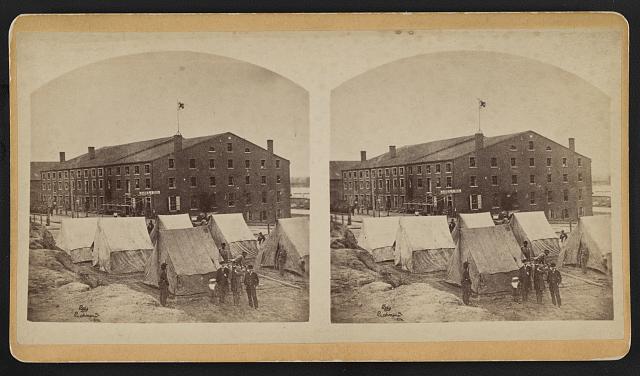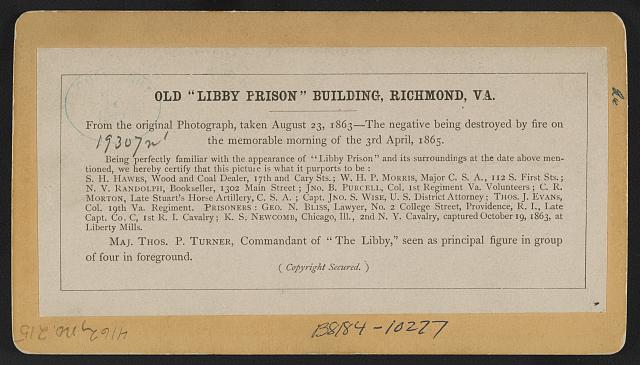The following stereograph of Richmond’s Libby Prison was taken 150 years ago today:
The Library of Congress also shows the back of the card with its statement of authenticity:
You can see a photograph of Libby’s commandant, Thomas P. Turner at Civil War Richmond. The Libby article at Encyclopedia Virginia points out that Thomas Turner was described by one prisoner as depraved, but Thomas was often confused with Richard Turner who was investigated in November 1865 by U.S. Secretary of War Edwin Stanton for “criminal treatment of prisoners”.
In this winter of 1863 Robert Knox Sneden map of Richmond’s prisons and Union soldier hospitals, Libby is correctly labelled as a prison for Union officers:
Libby also served as the processing center for enlisted men as could be inferred from this article in the Richmond Daily Dispatch on August 24, 1863:Prison Record.
–Since our last report the following prisoners have been received at the Libby, viz: Capt J. A. Arthur and 2d Lieut. D. R. Lock, 8th Kentucky cavalry, and thirteen privates from Knoxville, Tenn; twenty-three from Atlanta, captured on Black river, Miss; thirteen from Wilmington, N. C.–they were part of the crew of the shipgunboat
Nephon; five from Wytheville; one from Fredericksburg, captured at United States ford; five from Staunton, captured in Jackson county, and six from Gordonsville, captured at Thoroughfare Gap, by Captain Moler, of the 7th Virginia cavalry, on the 12th inst.
The Encyclopedia Virginia says that Libby prisoners “were plagued by overcrowding, disease, and hunger, with conditions worsening beginning at the end of 1862, when prisoner exchanges between the Union and Confederate armies slowed and sometimes halted.”
Well, at least two Libby’s might have eased the overcrowding



![Plan of part of Richmond, Virginia : showing locations of Rebel prisons [in] winter of 1863. (by Robert Knox Sneden; LOC: vhs01 vhs00025 http://hdl.loc.gov/loc.ndlpcoop/gvhs01.vhs00025)](https://www.bluegrayreview.com/wp-content/uploads/2013/08/jp2.py_.jpg)